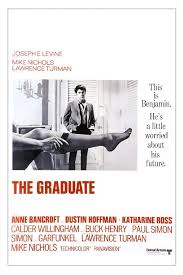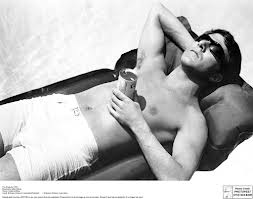The 1960s were a time of change. Social movements were ample, conformity was thrown into question and young people began to venture into a future that expressed their individuality as opposed to what their elders preferred them to do. In The Graduate, we see times change, but we aren’t exposed to rioting against corrupt political turmoil or tuned in to a decade of getting stoned while listening to Jimi Hendrix that most people think about when you mention the 60s. The Graduate, rather, uses sex to show the generational gap in America that defined the transition into a time of ending censorship and freeing the youth in an emotional sense.
Benjamin Barrdock comes home to a graduation party after graduating college, unaware of what he will do for the rest of his life. He goes through the motions in his home, saying hello to his parent’s friends as they attempt to give him life lessons, the most famous one being “plastics,” which I will touch on later in this post. But after seeing the wife of his father’s business partner, Mrs. Robinson, things begin to get interesting. After Ben takes her home, she invites him in, and begins to engage with him in a very seductive manner. When Ben is aware of this, he wants to leave before her husband comes home. She exposes her nude body to Ben, telling him she is all his whenever he wants it. From there, the affair begins. For a short while, everything that troubled Ben’s mind has escaped. Rather than applying to graduate schools, he spends his days floating in the pool and drinking beer, while having sex with Mrs. Robinson at night. But when Ben confesses he has feelings for her daughter, Elaine, she forbids him, and even calls of their affair. Ben and Elaine continue to see each other, but when Elaine finds out about the affair, she sides with her mother, and wants nothing to do with Ben. With Elaine off at college and engaged, Ben goes to break up the wedding, as he and Elaine drift off on the back of a bus, wondering what is left ahead after overcoming dissatisfaction.
As mentioned in the intro, sex was used as motif for how these characters escape the dissatisfaction that resides in their lives. Benjamin feels dissatisfaction from being done what is expected of him. While at the party, a friend of his parent’s says “There’s a great future in plastics. Think about it. Will you think about it?” Plastics mean just more than a product; it represents the propaganda of superficial proprieties that the youth of the 60s aimed to detach themselves from. We often see the 50s as a flawless generation and while in some ways the success they had in that decade will exceed any success the current generation will accomplish, it was just as scandalous(see Marilyn Monroe) and materialistic(the real “mad men” of the 50s) as any other period in American history. It was, however, not as explicit due to censorship. The scandalous affair aims to bring that censorship to an end and expose the hypocritical, risqué nature of the elders(Mrs. Robinson). He defies the rules and creates his own to the point of feeling free. Ben transforms from a boy with innocence and misguided tendencies to a man who is putting his priorities above everyone else’s. He has found himself and knows what he wants, and won’t settle for anything less.
Just like Rebel Without a Cause, The Graduate shows the frustrations from earlier generations that is expressed through sexual revelations as opposed to the angst of James Dean’s violence. Such a topic of adultery(especially with that big of an age difference) was seldom touched upon, if at all, during the 40s and 50s. The film, it shows how different times have changed. This isn’t to label the 60s as an indecent decade, but perhaps an emotional and explicit view of the underground 50s.





Reblogged this on liberryman.
LikeLike